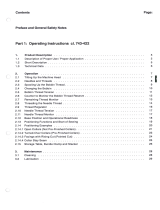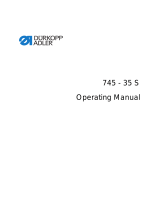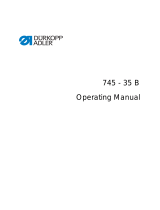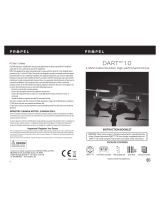Page is loading ...

Contents Page:
Preface and General Safety Notes
Part 1: Operating Instructions for the 743-121
1. Product Description
1.1 Technical Specification . . . . . . . . . . . . . . . . . . . . . . . . . . . . . . . . . . . . . . . . 5
1.2 Patents . . . . . . . . . . . . . . . . . . . . . . . . . . . . . . . . . . . . . . . . . . . . . . . . . 5
1.3 Optional Equipment . . . . . . . . . . . . . . . . . . . . . . . . . . . . . . . . . . . . . . . . . . 6
2. Operating the Sewing Unit
2.1 Needles and Threads . . . . . . . . . . . . . . . . . . . . . . . . . . . . . . . . . . . . . . . . . 6
2.2 Threading . . . . . . . . . . . . . . . . . . . . . . . . . . . . . . . . . . . . . . . . . . . . . . . . 6
2.3 Setting Thread Tension . . . . . . . . . . . . . . . . . . . . . . . . . . . . . . . . . . . . . . . . 8
2.4 Changing the Configuration Set . . . . . . . . . . . . . . . . . . . . . . . . . . . . . . . . . . . 8
2.5 Dart Depth . . . . . . . . . . . . . . . . . . . . . . . . . . . . . . . . . . . . . . . . . . . . . . . 10
2.6 Dart Length . . . . . . . . . . . . . . . . . . . . . . . . . . . . . . . . . . . . . . . . . . . . . . . 10
2.7 Setting the Insertion Depth of the Folding Table . . . . . . . . . . . . . . . . . . . . . . . . . . 12
2.8 Setting the Controls . . . . . . . . . . . . . . . . . . . . . . . . . . . . . . . . . . . . . . . . . . 13
2.9 Positioning the Sewing Pieces . . . . . . . . . . . . . . . . . . . . . . . . . . . . . . . . . . . . 14
2.10 Sewing . . . . . . . . . . . . . . . . . . . . . . . . . . . . . . . . . . . . . . . . . . . . . . . . . 14
3. Maintenance
3.1 Cleaning . . . . . . . . . . . . . . . . . . . . . . . . . . . . . . . . . . . . . . . . . . . . . . . . 15
3.2 Lubrication . . . . . . . . . . . . . . . . . . . . . . . . . . . . . . . . . . . . . . . . . . . . . . . 16
Home


1. Product Description
The
DÜRKOPP 743-121
is a sewing unit for the automated sewing of
single-point darts
with straight or curved seam configurations.
Maximum seam length 150 mm.
•
The unit is equipped with a machine head in double chain stitch
execution.
•
A configuration set appropriate to the seam configuration holds
and guides the material.
•
The seam length control occurs either via light barrier or
programming, as desired.
•
Seam securing at the beginning and end of the seam through stitch
condensing in the material and thread chain
•
Thread trimming system: Controlled chain trimmer
•
Transport carriage drive via step motor.
•
The complete control of the sewing unit occurs through a
micro-computer. It assumes the control tasks, monitors the sewing
process and signals operating errors and malfunctions.
•
An electronic thread monitor prevents a renewed starting of the
sewing procedure by thread breakage or when the thread is used
up.
1.1 Technical Specification
Machine head: Class 935 - 171 -100
Needle system: 934 SIN
Needle thickness: Nm 90
Threads: As needle and bobbin thread spun
monofilament sewing threads
Stitch type: 401 Double chain stitch
Stitch number: 4.800 / min
Stitch length: 2,2 mm
Stitch condensing: 1,0 mm
Sewing length: 150 mm
Folding table: 0 - 10° adjustable
Operating pressure: 6 bar
Air consumption: approx. 5 NL per work cycle
Nominal voltage: 0743 000524 3 ~ 380 - 400 V + N, 50 Hz
0743 000574 3 ~ 220 - 230 V, 50 Hz
0743 000644 3 ~ 220 - 230 V, 60 Hz
The sewing unit is delivered with
one
of the listed voltage sets
appropriate to the nominal voltage.
1.2 Patents
Following patents and registered utility models apply:
Status September 1993
42 28 943
5

1.3 Optional Equipment
0794 013222
Bundle clamp with swing arm and holder pipehr.
0794 000091
Supporting table (small).
(only in conjunction with the bundle clamp)
0794 000332
Remover device for smoothing the blown-out
sewing pieces.
(only in conjunction with the bundle clamp)
0794 013333
Blower pipe from the top or the right.
0794 013444
Supporting table
(when using in-house bundle clamp wagons)
0797 003031
Compressed air connection hose, connector
plug,
connector socket and hose clamp.
2. Operating the Sewing Unit
2.1 Needles and Threads
Needle system: 934 SIN
Needle thickness: Nm 90
Threads: As needle and bobbin thread spun
sewing threads
2.2 Threading
Caution Risk of Injury !
Turn main switch off.
Upper and lower threads may only be threaded with the machine
switched off.
The configuration set must be in the left end position.
Threading lower thread (Bobbin thread)
–
Place thread spool 2 on the thread stand.
–
Alternatingly feed the thread through all 4 guide eyes of the take
off arm 1.
–
Unlock the slider bed and pull to the side.
–
Guide the thread through the thread tensioner 4 + 5 and the thread
guide 12.
–
Swing up the flap 13 over the thread take up disk. Guide the thread
to the right past the pins.
–
Lead the thread through the hook 14 and pull tight.
–
Close the flap 13 over the thread take up disk.
The thread must be in the flap slot.
–
Return the slider bed to its initial position.
Hereby the leaf spring must lock in place.
Threading the upper thread (Needle thread)
–
Place thread spool 3 on the thread stand.
–
Alternatingly guide the thread through all 4 guide eyes of the
takeoff arm 1.
–
Guide the thread through the thread tensioner 6 + 7, thread guide
9, check spring 10 and thread monitor 11.
–
Lead the thread through the needle and the thread clamp.
Cut of the excess at the thread trimmer.
6

2.3 Setting the Thread Tension
There are 2 tensions to be set for each needle and bobbin thread at
the tensioning units.
The tension
normal
is always available.
The tension
enhanced
is only switched on in the area of stitch
condensing. This occurs pneumatically through the machine.
Needle thread tension:
1 normal: 70 g
2 enhanced: 120 g
Bobbin thread tension:
3 normal: 15 g
4 enhanced: 40 g
The value for the thread tension
enhanced
is the total tension of the
two individual tensions.
2.4 Changing the Configuration Set
A configuration set corresponding to the desired seam configuration
must be inserted.
Configuration set 0793 078001 = straight seam
Configuration set 0793 078002 = curved seam
Configuration set 0793 078xxx = customer version
Caution Risk of Injury !
Turn main switch off.
The configuration set may only be changed with the machine switched
off.
Removing the configuration set
–
Turn the handwheel until the needle is in the 2nd position
(OT)
.
–
Push the configuration set to the left end position.
–
Turn the grip 5 counterclockwise about 90°.
–
Lift the configuration set 6 at the left side and carefully detach from
the transport carriage.
–
Remove the configuration set.
Inserting the configuration set
–
Turn the handwheel until the needle is in the 2nd position
(OT)
.
–
Push the transport carriage into the left end position.
–
Carefully place the right side of the configuration set on the
transport carriage.
–
Turn grip 5 counterclockwise about 90° and lay the configuration
set completely onto the transport carriage.
–
Turn grip 5 back.
The configuration set is locked in and seated fast onto the
transport carriage.
–
Position the press-on cylinder 7 with the guide roller in the control
curve 8.
–
Push the configuration set to the right hand stop.
8

2.5 Dart Depth
The dart depth is dependent on:
–
the configuration set used
–
the dart length
–
the setting of the folding table
The folding table is continuously adjustable between 0 - 10°.
Example:
With configuration set
0793 078001
the dart depth is:
–
maximum 0.4 cm at 0° and 9.5 cm dart length
–
maximum 2.1 cm at 10° and 9.5 cm dart depth
THe diagram shows the dart depths for other angles and lengths. The
curve for configuration set
0793 078002
is also shown.
Setting the angle
–
Press the handle 2 together and adjust the folding table according
to the scale 1.
–
Release the handle.
The angle is set.
2.6 Dart Length
Maximum dart length 150 mm.
The dart length control occurs via programming ( Buttons L1, L2, L3 )
or the light barrier.
A programmed seam length control is recommended for diaphanous
material.
1
2
10

Work range dart
Example with configuration set
0793 078001
and
0793 078002
(1) Dart depth max. 2,1 cm at 10°, Length 9,5 cm
(2) Dart depth max. 0,4 cm at 0°, Length 9,5 cm
(3) Configuration set 0793 078001
(4) Configuration set 0793 078002
Work range waist pleat
Waist pleat length (cm)
Example with configuration set
0793 078034
(1) Waist pleat depth max. 3,2 cm at 5°, Length 5 cm
(2) Waist pleat depth max. 2,5 cm at 0°, Length 6 cm
(3) Configuration set 0793 078034
Angle adjustment range
Range of shapes
Dart length (cm)
Pleat width min.
Parallel adjustment range
Angle adjustment range
Range of shapes
11

2.7 Setting the Insertion Depth of the Folding Table
The first stitch of the needle into the material should occur as close as
possible to the front edge.
In order to achieve a uniformly slim dart point with differing material
thicknesses, the machine is equipped with a fine adjustment.
7 different insertion depths can be set with the stops 4.
Caution Risk of Injury !
Turn the main switch off.
The insertion depth may only be set or changed with the sewing unit
turned off.
Setting the insertion depth
–
Release lever 3.
–
Push the folding table a bit forward on the guide.
–
Set one adjusting screw 4 ( 7-off ) to the desired insertion depth.
–
Turn setting knob 2 to the desired insertion depth ( stop ).
–
Push the folding table to the back on the guide again.
The adjusting screw 4 must firmly touch the stop 1.
–
Tighten lever 3 again.
Changing the insertion depth
–
Release lever 3.
–
Push the folding table a bit forward on the guide.
–
Turn setting knob 2 to the desired insertion depth ( stop ).
–
Push the folding table to the back on the guide again.
The adjusting screw 4 must firmly touch the stop 1.
–
Tighten lever 3 again.
3
4
1
4
12

2.8 Setting the Controls
The setting of the controls is explained in detail in Part 4: Microcontrol
Summary !
At this point only those settings necessary for the sewing procedure
are listed.
Turn main switch on !
The programming of the controls occurs with the main switch turned
on !
The machine is not to be started unintentionally.
–
Set the
" Program "
switch to
" 01 "
or
" 02"
.
The sewing program is selected.
–
Push the
" STOP "
button.
The sewing program is activated.
–
Setting the seam length.
Press button
" L1 "
or
" L2 "
or
" L3 "
.
Set the desired value with the
" + "
or
" - "
.
Establishing the seam length with the light barrier.
Press the button.
–
Setting the soft start.
Press the button.
The diode is lit when the function is selected.
–
Setting stitch condensing at the seam beginning.
Press the button.
The diode is lit when the function is selected.
–
Setting stitch condensing at the seam end.
Press the button.
The diode is lit when the function is selected.
–
Setting the remover.
Press the button.
The diode is lit when the function is selected.
–
Setting the blower from the top or to the right.
Press the button.
Pressing the button repeatedly switches between the functions
"top/right/off".
The left diode is lit when the function
" Blower from the top " is selected.
The right diode is lit when the function
" Blower from the right " is selected.
–
Setting the normal stitches and the stitch condensing.
Press the button.
The left line of display indicated the number (0 to 20) of regular
stitches up to the stitch condensing.
Set the desired value with the
" + "
or
" - "
.
Press the button.
The right line of display indicated the number (0 to 8) of
condensed stitches.
Set the desired value with the
" + "
or
" - "
.
Press the button. (The engagement is finish.)
The controls are now completely set.
13

2.9 Positioning the Sewing Pieces
–
Mark the dart depth on the fold plate 1 with thinnest possible
smooth adhesive tape.
–
Place the sewing piece over the edge of the fold plate with both
hands.
–
Bring the cut edges together with the right hand so that the edges
match.
–
Align the small hole for the dart length precisely at the back edge
of the fold plate.
–
Hold the material in place at the front edge with the right hand and
push in the fold plate.
The material is held in place by the configuration set.
The fold plate runs to the back.
The sewing procedure is carried out.
2.10 Sewing
After the main switch is turned on or the
" STOP "
button is pushed, the microcomputer checks the initial
settings of the machine.
The needle is brought to its initial position.
If no fault is found the
" <--- REF ---> "
or
" REF ---> "
display will
appear.
This means that the configuration set must be run to the reference
point.
Press the
" Σ "
button.
The configuration set travels to the reference point.
Starting sewing
–
Insert material.
–
Push in the folding table with the material.
The sewing cycle starts.
CAUTION !
Do not push in the folding table without material !
The friction surface of the configuration set could be damaged.
1
14

3. Maintenance of the Sewing Unit
Caution Risk of Injury !
Turn main switch off.
The maintenance of the sewing unit may only take place with the
machine turned off.
3.1 Cleaning
A clean machine protects against malfunctions !
Daily cleaning:
–
Remove all accumulations of lint.
–
Clean the light barrier with a soft cloth.
–
Check the water level in the pressure regulator.
The water level should not be allowed to climb up to the filter.
After screwing in the drain plug 1, blow out the water under
pressure.
Depending on the amount of dust present:
–
Clean the motor ventilation sieve.
–
Clean the filter 2 on the step motor drive.
1
2
15
/













